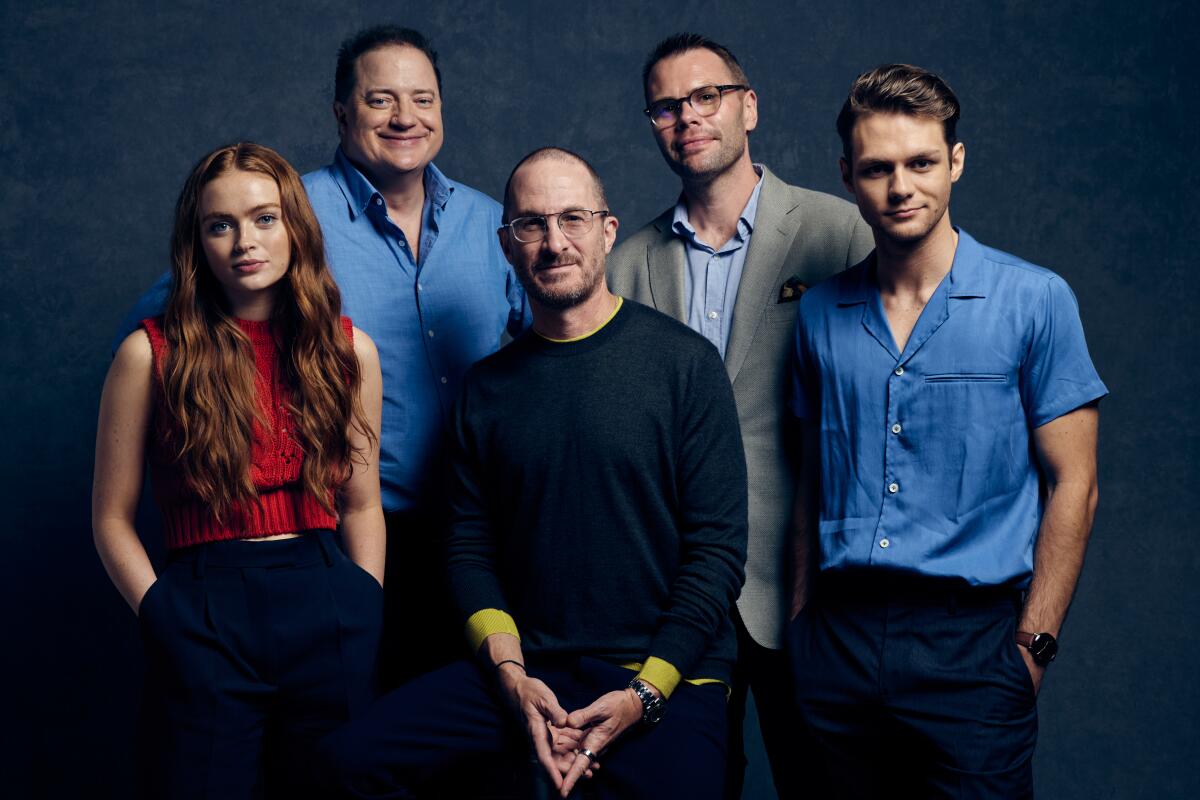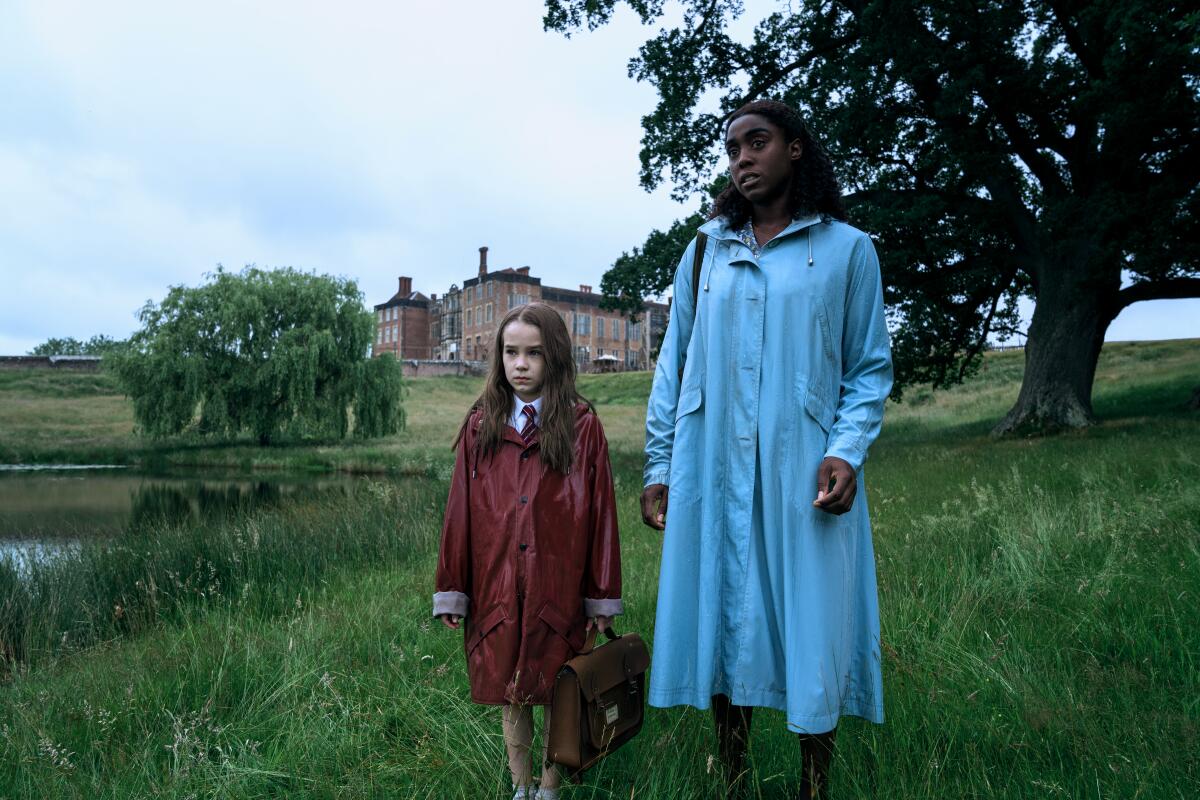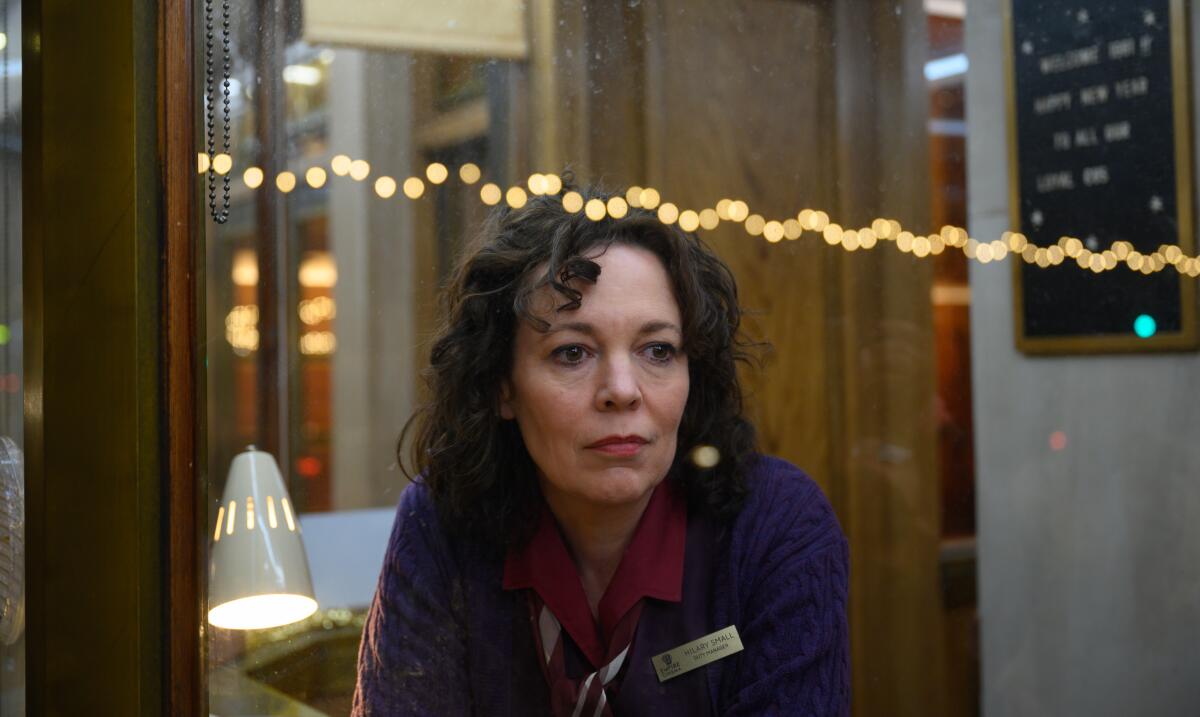Empathy and controversy follow ‘The Whale’

- Share via
Hello! I’m Mark Olsen. Welcome to another edition of your regular field guide to a world of Only Good Movies.
Only good movies
Get the Indie Focus newsletter, Mark Olsen's weekly guide to the world of cinema.
You may occasionally receive promotional content from the Los Angeles Times.
Envelope Actress Roundtable. This week saw the first of this year’s Envelope roundtables released, recorded in-person for the first time since 2019. Amy Kaufman sat down with Angela Bassett for “Black Panther: Wakanda Forever,” Kerry Condon for “The Banshees of Inisherin,” Emma Corrin for “Lady Chatterley’s Lover,” Danielle Deadwyler for “Till,” Laura Dern for “The Son” and Janelle Monáe for “Glass Onion: A Knives Out Mystery.”
On taking time for herself even amid a busy workload, Bassett said, “I was always a big believer that when you go into a room, you take an energy in there with you. And I don’t think a desperate energy is attractive to others. Find those things that please you — your pleasure. You have that, and that’s much more attractive. You go in, you drop that, you leave, and they’re like, ‘Hey!’”
Keke Palmer podcast. This week, “The Envelope” podcast found Yvonne Villarreal talking to Keke Palmer, co-star of Jordan Peele’s “Nope.” (Palmer also made headlines this week when she used hosting “Saturday Night Live” as an opportunity to publicly announce her pregnancy.)
On her role in “Nope,” Palmer said she appreciated “being able to reach a dramatic place and an emotional spot with Emerald that a character that usually is deemed as the comic relief doesn’t usually have. So I was happy about being able to kind of bridge these two archetypes of jester and orphan together to create, you know, what is the character Emerald. And then I would say the collaborative aspect of the project I think was unique. Jordan is an extremely collaborative writer and director. Maybe that comes from his background with sketch and just being a talented comedian. Regardless of what the reason is, I was really appreciative of it.”
‘Alice, Darling’ screening event. On Wednesday, Dec. 14, we will have an Indie Focus Screening Series event featuring the movie “Alice, Darling,” which premiered at the Toronto International Film Festival, followed by a Q&A with its star, Anna Kendrick. We’ll be back at the AMC Sunset 5, starting at 7 p.m.
Enjoying this newsletter? Consider subscribing to the Los Angeles Times
Your support helps us deliver the news that matters most. Become a subscriber.
‘The Whale’
Directed by Darren Aronofsky from a screenplay by Samuel D. Hunter adapting his own play, “The Whale” has generated both praise and criticism for its depiction of an obese man. Brendan Fraser plays Charlie, who is attempting to reconnect with his daughter (Sadie Sink) before he dies of heart failure. With a supporting cast that also includes Hong Chau and Samantha Morton, the movie is in theaters now.
For The Times, Justin Chang grappled with what is good and bad about the film. Attempting to unravel what to attribute to Fraser and what to Aronofsky, he wrote, “Is this raw, unvarnished scrutiny of a difficult subject tilting into exaggeration, even exploitation? If we’re disgusted by what Aronofsky shows us, is that our fault or his? Or is it Fraser’s? … A performance as reliant on external wizardry as Fraser’s — on the strange, seamless alchemy that welds an actor’s expressive tools to an array of digital and prosthetic tricks — doesn’t come into being without a director’s firm hand at the wheel. What’s good and bad about the performance is surely the responsibility of actor and director both.”
Aronofsky will be on next week’s episode of “The Envelope” podcast. On what inspired this adaptation, he said, “I was deeply moved by the play. And so the next day, I reached out to Sam, and we got together, and I knew it would be a challenge to turn this into cinema, but — the amazing thing about movies, what I really love about cinema is that it is this great exercise in empathy and that you can watch a movie about any person in the world, and if it’s an honest, truthful portrayal, you will be brought into their life, into their circumstance. Because we’re all human.”
For the New York Times, A.O. Scott wrote, “as an exploration of — and argument for — the power of human sympathy, ‘The Whale’ is undone by simplistic psychologizing and intellectual fuzziness. Aronofsky has a tendency to misjudge his own strengths as a filmmaker. He is a brilliant manipulator of moods and a formidable director of actors, specializing in characters fighting their way through anguish and delusion toward something like transcendence. … but ‘The Whale,’ like some of Aronofsky’s other projects, is swamped by its grand and vague ambitions. It’s overwrought and also strangely insubstantial.”
For Slate, Dana Stevens wrote, “Is ‘The Whale,’ at its core, an exercise in fatphobia? As a critic and viewer who is not a member of the plus-size community, I’m not certain it’s my place to answer. The movie’s defects strike me more as lapses in tone and taste than as an error in the choice of subject matter: It’s possible to imagine a film about the same subject that didn’t turn its main character into a spectacle for pity, or one that cast an actor closer to Charlie’s weight in the lead, rather than just a heavyset one in a padded suit. It’s also possible to imagine some viewers, whatever their size, finding beauty and empathy in Aronofsky’s portrait of a soul in freefall. And certainly Fraser—who plays Charlie as a wonderfully specific individual, with his own deep character flaws along with a tender heart and a sly sense of humor—goes a long way toward humanizing a character who could easily be nothing but a confluence of leaden metaphors.”
For Vulture, Bilge Ebiri wrote, “Fraser and Aronofsky have talked about trying to portray Charlie’s life-threatening obesity in a compassionate manner, including in their use of prosthetics, which has come under some criticism. … But here’s the thing: The film is built around the idea of revulsion and extreme consumption. It has multiple scenes of Charlie eating enormous amounts of food. He stress-eats candy bars when he Googles details about his medical condition. At one point, riddled with shame and guilt, he cries, gorges on piles of food, then vomits it out before our eyes. The idea is that this man is killing himself. The food isn’t so much food as it is a metaphor for all the hurt and pain he’s absorbed. The whole thing is a metaphor, and as such, it’s pitched a few degrees off from reality.”

Enjoying this newsletter? Consider subscribing to the Los Angeles Times
Your support helps us deliver the news that matters most. Become a subscriber.
‘Matilda the Musical’
Directed by Matthew Warchus with the unwieldy full title of “Roald Dahl’s Matilda the Musical,” the film is an adaptation of the popular stage musical based on Dahl’s novel. With energetic musical numbers, the film stars Alisha Weir in the title role as a little girl with a vivid imagination and transformative intelligence sent away to a boarding school. The film’s cast also includes Emma Thompson, Stephen Graham, Andrea Riseborough, Sindhu Vee and Lashana Lynch and is in theaters now before launching Dec. 25 on Netflix.
For The Times, Justin Chang wrote, “For a movie that bristles with more revolutionary fervor than Dahl’s quieter, more inward-focused story, ‘Matilda the Musical’ could use a little messier, more rambunctious energy. The focus and discipline of Warchus’ direction is undeniable, perhaps to a fault: It’s hard not to feel that a 2½-hour show has been whittled down to within an inch of its upbeat, family-friendly life. The surges of emotion are still there, the final comeuppances still rousing, even if the climax itself smothers its most electrifying twist with some predictably ostentatious visual effects. It all can’t help but reinforce Dahl’s point — as well as Matilda’s own steadfast conviction — that the screen really has nothing on the printed word.”
For the Hollywood Reporter, Leslie Felperin wrote, “Where the inelegantly but undoubtedly quite specifically titled ‘Roald Dahl’s Matilda the Musical’ really makes its bones is in the big, showstopping numbers like ‘School Song’ and ‘Revolting Children,’ in which the ensemble of tightly rehearsed tykes get to strut their stuff. Usually looking and singing right at the camera, which seems to recoil in retreat from their assault, they’re the most badass assembly of school kids to come along since Malcolm McDowell burned down the academy in ‘If …’ (1968). They’re not problematic; they’re problem-solvers.”

‘Empire of Light’
Written and directed by Sam Mendes, “Empire of Light” has its roots in the era of his own coming-of-age in 1980s England. Set amid a fading cinema in a seaside town, the story involves Hilary, a lonely and troubled woman played by Olivia Colman, who finds her life reinvigorated by Stephen, a younger employee played by Micheal Ward. With beautiful cinematography by Roger Deakins, the movie is in theaters now.
For Tribune News Service, Katie Walsh wrote, “For movie lovers and appreciators of the experience of 35-millimeter film projected in a beautiful old movie house, it’s easy to understand where Mendes is coming from, and to agree with his assertions. But as a movie lover wanting to fall in love with a story, ‘Empire of Light’ does not provide that experience. Deakins’ work is beautiful, Colman is incredible, and the role of Stephen proves to be a breakout for Ward. But the story is too scattershot and contrived for an audience to be swept away and moved in the same way that Colman finds herself swept away by the experience of the Peter Sellers classic ‘Being There.’ We don’t need someone to remind us that movies are magic by stating that upfront, usually it’s the magic of storytelling itself that achieves that, which ‘Empire of Light’ ultimately, and unfortunately, fumbles.”
For the New York Times, A.O. Scott wrote, “For a while, their romance unfolds in a quiet, quotidian rhythm that allows you to appreciate Colman and Ward’s fine-grained performances. … It’s inevitable that the spell will break, and when it does, ‘Empire of Light’ falters. Mendes raises the stakes and accelerates the plot, pushing Hilary and Stephen through a series of crises that weigh the movie down with earnest self-importance. A film that had seemed interested in the lives and feelings of its characters, and in an unlikely but touching relationship between two people at odds with the world around them, turns into a movie with Something to Say.”
For the Washington Post, Ann Hornaday wrote, “‘Empire of Light’ occasionally overplays its sentiment — a subplot involving an injured bird feels manufactured and contrived. But it’s a soothingly beautiful film — visually pleasing, emotionally rich, and authentically touching when it comes to Hilary and Stephen’s evolving relationship. … Mendes pays homage to the films of his youth by way of the films that play as a way to mark time: ‘Stir Crazy’ here, ‘Raging Bull’ there; but his ode to the medium he loves goes even deeper, not just to its power to generate empathy, but to its pluralism. In ‘Empire of Light,’ the theater is a great democratizer: a convener for misfits, loners and dreamers of every stripe. With this bittersweet gem of a film, Mendes has given spectators a modest but profound gift: the reminder that, at their best, movies offer us not just a refuge, but a way to join the thrum of life, in all its pain and ungovernable glory.”
For the AP, Lindsey Bahr wrote, “There is an overwhelming melancholy to the whole endeavor, which is handsomely shot by Roger Deakins and feels like a farewell to something. Mendes, who also wrote the script, was inspired by a pivotal era in his own life. … He was a teenager at the time. But this isn’t ‘The Fabelmans’ or ‘Armageddon Time.’ Mendes has not made his teenage self the protagonist, but instead a woman in middle age who is suffering from mental health issues, and a magnetic younger Black man, Stephen (an excellent showcase for [Micheal] Ward), who [is] far too smart and vibrant for this provincial town. Hilary and Stephen become friends, then lovers, but, you know, it’s complicated and the film is a bit meandering in getting where it’s going.”

Only good movies
Get the Indie Focus newsletter, Mark Olsen's weekly guide to the world of cinema.
You may occasionally receive promotional content from the Los Angeles Times.




